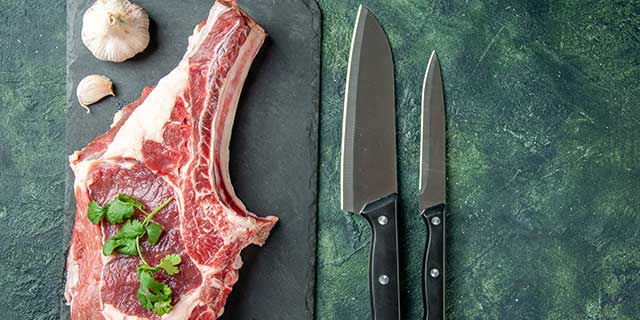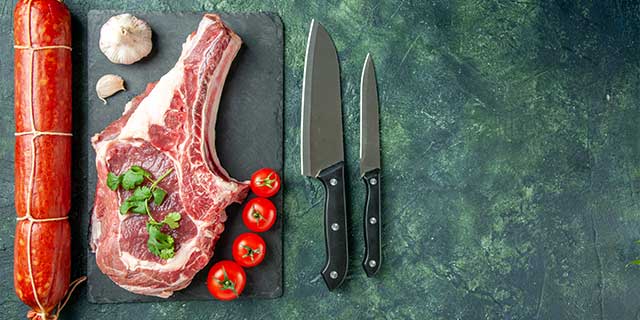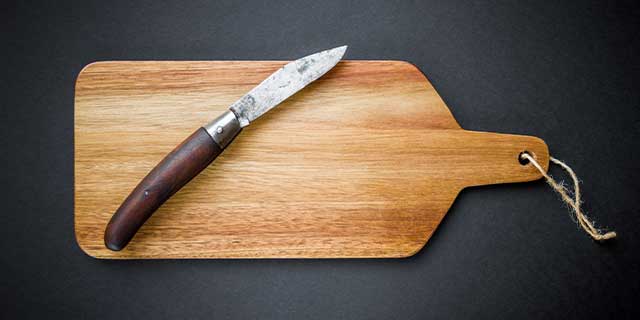While there is no dearth of options, ceramic knives vs. metal knives continue to be a topic of discussion among cooking enthusiasts. But the reality is they both have their pros and cons. Like other cutlery items, your purpose determines which knife you should select.
Once you know what you’ll need the knife for, you can investigate the pros, cons, and differences to make the right decision. Fortunately, you don’t have to spend a lot of time finding this information online, as we’ll provide it in detail in this post.
Let us quickly go through their advantages and disadvantages before discussing their differences in a language that even beginners can understand. Rest assured that by the end of this post, you’ll be all set to make a decision.
Ceramic Knives: Pros and Cons
Do you know that the material used for making ceramic knives is one of the hardest in the world? With a Mohs scale rating of 8.5, the hardness of ceramic is only second to diamond. These knives are commonly made from a combination of hard ceramic and zirconium oxide. The materials are dry pressed and sharpened for creating ceramic knives.
Here are some of the pros and cons of ceramic knives-
Pros
- Able to retain sharpness for a longer duration
- Ceramic does not react with food products
- No issue of rusting
Cons
- Ceramic knives chip very easily
- Sharpening requires professional assistance/tools
- Generally pricier
Metal Knives: Pros and Cons
Metal knives are made from stainless steel, titanium, iron, carbon, etc., or even from a combination of these materials. Due to this, the durability and hardness can significantly vary between different knives. One of the top advantages of these knives is their versatility. Be it utility, paring, serrated, or cutting, the knives suit various requirements.
Here are some of the pros and cons of metal knives-
Pros

- Highly versatile
- Knives can be sharpened easily
- Highly affordable
Cons
- Some metal knives rust easily
- Unable to retain sharpness for a longer duration
Ceramic Knives vs. Metal Knives: Top Differences
Now that you know some of the ceramic knives vs. metal knives pros and cons, let us quickly go through their top differences to help you make the right selection.
1. Sharpness and Sharpness
-
Ceramic Knives
We’ve already mentioned above that ceramic knives are super sharp but require professional tools or assistance for sharpening. On the other hand, you can easily sharpen metal knives on your own. It is also worth noting that the sharpening process also significantly varies between the two.
Ceramic knives require a grinding wheel that is generally coated with diamond dust for sharpening. In most cases, you’ll have to contact the manufacturer/dealer or a professional to get the ceramic knife sharpened. But once correctly sharpened, the knives retain the edge for a longer duration.
-
Metal Knives
Knives made from metal are also very sharp when they are new. But if you use them daily, it’ll not take more than a few months for them to lose the edge. You can use a sharpening stick/rod or whetstone to sharpen these knives on your own.
As opposed to knives made from ceramic, you can easily sharpen metal knives on your own. However, they require regular sharpening.
2. Durability
-
Ceramic Knives
Durability is a cause of concern every time you purchase tableware or flatware. If used correctly, ceramic knives are generally very durable.
Corrosion and rust are never an issue with these knives. Even if you don’t sharpen it, you can continue using the knife. But if you drop the knife or use it to cut very hard or solid items, it won’t last long.
-
Metal Knives
Steel knives are pretty rugged and strong. While rusting can be an issue with knives made from some metals, they generally last for several years before needing a replacement.

If you sharpen the knives regularly and only use them for cutting vegetables and fruit, they can be a reliable kitchen companion for years. They won’t break even if you drop them.
3. Versatility
-
Ceramic Knives
Another critical aspect of ceramic knives vs. metal knives is their versatility. Ceramic knives are not the right choice for you if you are looking for a versatile knife.
While the knives are pretty amazing for intended cutting tasks, they are only ideal for delicate foods. You can use one regularly for cutting wet or soft foods.
-
Metal Knives
Metal knives prove to be a superior choice if you are looking for a versatile knife. Be it delicate foods, meat, or cheese blocks; they can deliver flawless cutting results.
It is also easier to find metal knives for different cutting and slicing tasks. Use them for the task they are intended for, and there shouldn’t be any problem. If you need a versatile knife, there are also all-purpose metal knives that you can consider.
4. Cost
-
Ceramic Knives
If you are looking for a pocket-friendly and versatile knife, ceramic might not be the option for you. Quality ceramic knives from top brands are generally expensive.
-
Metal Knives
With metal knives, you can find a product across every price point. You can find cost-effective all-purpose knives, knife sets, and even high-end knives in this category.
5. Maintenance
-
Ceramic Knives
The last ceramic knives vs. metal knives difference is their maintenance. With ceramic knives, you need to ensure that you don’t use them for cutting hard or frozen items.
You should also be careful so as not to drop them. These knives should always be washed by hand as they are not safe for dishwashers.
-
Metal Knives
Unlike ceramic knives, metal knives are not high maintenance. They generally don’t chip or break even if you drop them multiple times.

But as some metal knives are prone to rust and corrosion, you should clean them after every use and store the knives correctly. They are also dishwasher safe.
What Should You Choose Between Ceramic and Metal Knives?
As can be seen, both ceramic and metal knives have their pros and cons. You should focus on your requirements to choose a knife that is right for you.
Also, no matter what you end up choosing, only trust a reputable tableware store online for your purchase as the product quality is directly linked to the seller. Products from leading online portals can be trusted for their quality and longevity.

